Iron John and Joan throws lifeline to kids
STORY AND PHOTOGRAPHY BY KELSEY LYONS

The Iron John and Iron Joan program hosted the Toys for Tots Charity hockey game. Admissions to the game were either any unwrapped toys or a $2 donation.
Sheridan’s Police Foundations program offers its students a way to gain experience that can help them land a job in the field by mentoring at-risk youth.
The Iron John program for boys and now the Iron Joan program for girls, was started about seven years ago.
Police Foundations student and Iron John member Alan Griffith, 23, says that this program will not only help him in the future but it’s also helping kids today.
“They can rely on this program, something they might not be able to rely on at home,” Griffith said. “So every week, at a certain time, this person’s going to come in and help them, give them positive reinforcement.”
He says that it’s a good opportunity to get an experience working with kids. Prior to this program he hasn’t had much experience with kids outside of his family.
Another Iron John member, Shaun Watson, 25, agrees and he says it’s important to understand how to deal with kids appropriately.
“I notice there’s a lot of cops out there that can’t bond very well with kids. They don’t know how to go down to their level,” he said. “So just this experience, it really makes you realize how much attention you need to give kids, before you just get going into a situation.”
The Iron John and Iron Joan Program was started by Police Foundations professor and former Peel Regional Police officer Tim Onyschuk and his colleague Tanya Philp, who runs the Iron Joan program.
Onyschuk says there are a hundred and one reasons why he started the program.
“The main part comes down to, I teach courses on youth and conflict with the law and much of the research shows that young boys [and girls] without positive role models get into trouble,” he said.
And Onyschuk noticed he had a pretty great group of students and he could see that they would make good role models.
“So, I was like ‘Okay, you have to be able to put the research into practice,’ ” he said. “I had the students and we know what the problems are so it was a pretty easy equation to figure out.”
Onyschuk said they did their research to find the elementary schools that needed help. They looked at some of the low-income areas of Brampton, because that’s where the kids need resources.
“So we approached the schools and said, ‘Here’s what we’ve got. We’d like to put our guys and girls in the schools to help during the day, help the teachers in any way that we can,’ ” he said. “The principals were all for it, thought it was a great program. They embraced it all the way.”
When students are applying to jobs in the field, they need to show their commitment to the community through volunteer hours.
“[They] have to show life experience,” Onyschuk said. “So a lot of the guys and gals are pretty young. We try and increase their life experience, through their experience in the school.”
Police Foundations professor and former Peel Regional Police officer Malcolm Bow who is running the program this year, agrees with Onyschuk.
“One of the big things is the volunteer time,” Bow said. “Police services won’t hire you until you have shown community involvement. It really sets them up for the application process for policing.”
Bow says that this program is a huge commitment.
“It’s not for the faint of heart and because the commitment for students, just time alone is phenomenal,” he said. “And that’s on top of everything else. Their academics are expected to excel, so it’s not like they can make up for one by doing this [program].”
By the end of their time in the program, students will have accumulated about 200 hours.
The students spend one day a week at the school, in the classrooms, helping the teachers and mentoring the kids.
“They’re often mentoring specific kids that are having trouble learning or there are maybe some behavioural issues,” said Bow.
They are also helping out at recess, breaks and there are after school programs, which include an athletic aspect as well.
Bow says that this is one of those programs that add value to what the students are studying in class.
“One of the main benefits is to our students, the other benefit is to the community,” said Bow. “Our enriched students get to mentor kids that are at risk, kids that need people to help mentor them through school. These kids are from single-parent homes, from disadvantaged homes, so they have a huge impact on these kids, provide an outlet for them.”
Police Foundations students Dana Brown, 20 and Amy Mills, 20, are both involved in the Iron Joan program and they see this as a great component for their resumes.
“Just saying that you have that extra-curricular activity at school, that you’re not just going to school and just going home. It shows great initiative,” Brown said.
Brown says that this program will not only help her get a job in the future but it’s helping with her grades as well, because she wants to be a good role model for the kids.
“You don’t want to be that person that’s getting bad grades, then preaching good grades,” she said. “You want to have that same mindset as them.”
Mills says this program is also a good opportunity for students who don’t normally participate in activities outside of school.
“It gives them a chance to do things they wouldn’t normally be able to do,” she said.
She says it also gives them as college students a perspective on lives outside of our own.
“It’s just a good thing for everyone,” Mills said. “I think everyone who’s not in the program kind of wishes they were because of how everyone one ups it. I also do Big Brother, so I just like working with kids. It’s a good experience and they really appreciate it.”




